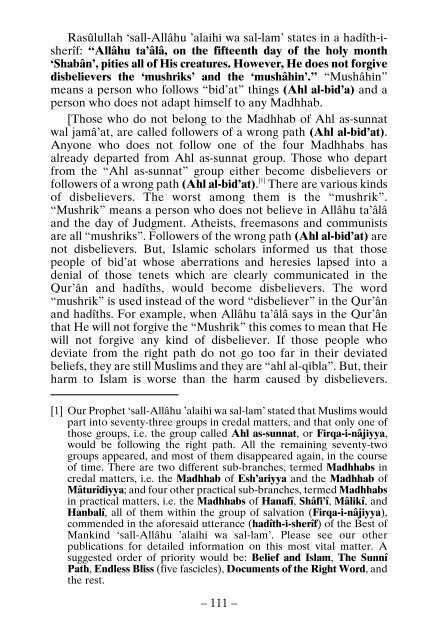Ethics of Islam
Ethics of Islam is taken from the book Berîka by Muhammad Hâdimi. Immorality and ways to get rid of it; 40 depravities and cures to them; usefulness of ethics; what is a soul; strengths of a soul; Personalities emanating from wisdom, courage, chastity and justice are extensively explained.
Ethics of Islam is taken from the book Berîka by Muhammad Hâdimi. Immorality and ways to get rid of it; 40 depravities and cures to them; usefulness of ethics; what is a soul; strengths of a soul; Personalities emanating from wisdom, courage, chastity and justice are extensively explained.
You also want an ePaper? Increase the reach of your titles
YUMPU automatically turns print PDFs into web optimized ePapers that Google loves.
Rasûlullah ‘sall-Allâhu ’alaihi wa sal-lam’ states in a hadîth-isherîf:<br />
“Allâhu ta’âlâ, on the fifteenth day <strong>of</strong> the holy month<br />
‘Shabân’, pities all <strong>of</strong> His creatures. However, He does not forgive<br />
disbelievers the ‘mushriks’ and the ‘mushâhin’.” “Mushâhin”<br />
means a person who follows “bid’at” things (Ahl al-bid’a) and a<br />
person who does not adapt himself to any Madhhab.<br />
[Those who do not belong to the Madhhab <strong>of</strong> Ahl as-sunnat<br />
wal jamâ’at, are called followers <strong>of</strong> a wrong path (Ahl al-bid’at).<br />
Anyone who does not follow one <strong>of</strong> the four Madhhabs has<br />
already departed from Ahl as-sunnat group. Those who depart<br />
from the “Ahl as-sunnat” group either become disbelievers or<br />
followers <strong>of</strong> a wrong path (Ahl al-bid’at). [1] There are various kinds<br />
<strong>of</strong> disbelievers. The worst among them is the “mushrik”.<br />
“Mushrik” means a person who does not believe in Allâhu ta’âlâ<br />
and the day <strong>of</strong> Judgment. Atheists, freemasons and communists<br />
are all “mushriks”. Followers <strong>of</strong> the wrong path (Ahl al-bid’at) are<br />
not disbelievers. But, <strong>Islam</strong>ic scholars informed us that those<br />
people <strong>of</strong> bid’at whose aberrations and heresies lapsed into a<br />
denial <strong>of</strong> those tenets which are clearly communicated in the<br />
Qur’ân and hadîths, would become disbelievers. The word<br />
“mushrik” is used instead <strong>of</strong> the word “disbeliever” in the Qur’ân<br />
and hadîths. For example, when Allâhu ta’âlâ says in the Qur’ân<br />
that He will not forgive the “Mushrik” this comes to mean that He<br />
will not forgive any kind <strong>of</strong> disbeliever. If those people who<br />
deviate from the right path do not go too far in their deviated<br />
beliefs, they are still Muslims and they are “ahl al-qibla”. But, their<br />
harm to <strong>Islam</strong> is worse than the harm caused by disbelievers.<br />
[1] Our Prophet ‘sall-Allâhu ’alaihi wa sal-lam’ stated that Muslims would<br />
part into seventy-three groups in credal matters, and that only one <strong>of</strong><br />
those groups, i.e. the group called Ahl as-sunnat, or Firqa-i-nâjiyya,<br />
would be following the right path. All the remaining seventy-two<br />
groups appeared, and most <strong>of</strong> them disappeared again, in the course<br />
<strong>of</strong> time. There are two different sub-branches, termed Madhhabs in<br />
credal matters, i.e. the Madhhab <strong>of</strong> Esh’ariyya and the Madhhab <strong>of</strong><br />
Mâturîdiyya; and four other practical sub-branches, termed Madhhabs<br />
in practical matters, i.e. the Madhhabs <strong>of</strong> Hanafî, Shâfi’î, Mâlikî, and<br />
Hanbalî, all <strong>of</strong> them within the group <strong>of</strong> salvation (Firqa-i-nâjiyya),<br />
commended in the aforesaid utterance (hadîth-i-sherîf) <strong>of</strong> the Best <strong>of</strong><br />
Mankind ‘sall-Allâhu ’alaihi wa sal-lam’. Please see our other<br />
publications for detailed information on this most vital matter. A<br />
suggested order <strong>of</strong> priority would be: Belief and <strong>Islam</strong>, The Sunnî<br />
Path, Endless Bliss (five fascicles), Documents <strong>of</strong> the Right Word, and<br />
the rest.<br />
– 111 –

















